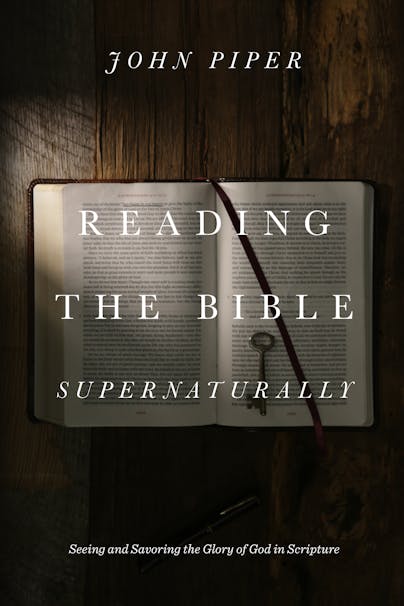11-27-18 Pray Your Way to Wonder
Pray Your Way to Wonder
How to See More Beauty in the Bible

Open my eyes, that I may behold wondrous things out of your law. (Psalm 119:18)
All of us know what it is like to read without seeing “wondrous things.”
We have stared at the most glorious things without seeing them as glorious. We have seen unspeakable love without feeling loved. We have seen immeasurable wisdom and felt no admiration. We have seen the holiness of wrath and felt no trembling. Which means we are seeing without seeing (Matthew 13:13).
This is why we must weave the thread of God-dependent prayer into our reading: “Show me your glory” (Exodus 33:18). God has made plain that the path to seeing his peculiar glory is prayer. How much light have we forfeited by failure to pray over the word we are reading! “You do not have, because you do not ask” (James 4:2).
Glory Shines in the Meaning
True understanding of the apostolic word is a free gift of God. We do not find it on our own. It is given. That is why we pray, “Give me understanding.” But the divine gift of understanding does not nullify our natural effort to understand the Bible. We see this in 2 Timothy 2:7: “Think over what I say, for the Lord will give you understanding in everything.”
“When we pray, we are not asking God to bypass the meaning of the text, but to open the fullness of the meaning.”
When we pray for God to show us his glory in the Scripture, we are not asking him to bypass the meaning of the text, but to open the fullness of the author’s meaning. Therefore, in our quest to see and savor the glory of God in Scripture, we pray for his help to grasp the basic meaning of the words. Glory does not hover over the text like a cloud to be seen separately from what the authors intended to communicate. It shines in and through what they intended to communicate — their meaning.
Even this is not quite the way to say it, because the glory is part of what they intended to communicate. But I think it is helpful to distinguish the basic meaning of a passage, on the one hand, and the worth and beauty of the message, on the other hand. I know they are not really separable. And both are part of what the author wants us to experience. Perhaps an illustration will help us see why I think the distinction is important, and how it relates to prayer.
Heaven or the Countryside?
In Philippians 1:23, Paul says, “My desire is to depart and be with Christ, for that is far better.” Suppose some careless reader knew that Paul was in Rome and assumed Paul meant that his desire was to depart from Rome and be with Christ in a more rural, peaceful place than the dangerous urban center of the empire. And suppose the reader feels that this is a wonderful thought, full of sweet implications about the value of nature and peacefulness for the soul’s refreshment.
Well, he would be wrong. First, this careless reader got the basic meaningwrong. Paul did not intend to say anything about departing from Rome to the countryside, or about the value of rural peacefulness. He intended to say that he desired to depart this life and be with Christ in heaven. So our reader simply missed Paul’s intention.
But it gets worse. On the basis of the wrong meaning, this careless reader also saw a kind of glory that was not there. He felt a sweetness about peaceful, rural living for the refreshment of the human soul. That feeling has no basis in this text. He has seen something he would call glorious or wonderful. But the glory and the wonder are not there.
“One good, solid grammatical argument outweighs every assertion that the Holy Spirit told me the meaning.”
The point of that illustration is this: when the psalmist prayed, “Open my eyes, that I may behold wondrous things out of your law” (Psalm 119:18), he did not mean that the sight of wonders could skip the natural process of careful reading. Therefore, prayer does not take the place of careful interpretation. Prayer serves careful interpretation. We pray not just for the sight of glory, but for the help in grasping the meaning through which the glory shines.
The way God illumines the text is by showing what is really there. This means that when we want to make a case for how we understand a text, we must show what is really there. One good, solid grammatical argument for what the text means outweighs every assertion that the Holy Spirit told me the meaning. The reason that statement is not irreverent is that it takes more seriously the glorious work of the Holy Spirit in inspiring the grammar than it does the subjective experiences of an interpreter who ignores it.
Prayer Improves Every Method
However we describe the levels of a text’s meaning, prayer is fruitful at every level. God not only opens the eyes of our heart to see his glory; he also guides us providentially in the whole process of interpretation — even the most natural parts. He is sovereign over all of it. He governs every part of our textual observation or thinking or research. Jesus said that not a sparrow falls to the ground apart from our heavenly Father (Matthew 10:29). So it is with Bible reading. We do not make the smallest discovery without God’s providential guidance.
So we should be praying for God’s guidance repeatedly during the entire process of reading and studying the Bible. The number of things you could pray for to help you see what is in the Scripture is as great as the number of strategies for getting insight. God can make all of them more fruitful, if we ask him. This would include:
- Prayer to help you pay close attention to all the features of a text.
- Prayer to guide you to notice parts of the text that are especially illuminating.
- Prayer to lead you to other passages in the Bible that would shed light on the one you are reading.
- Prayer to lead you to other books or sermons or lectures that would be useful in shedding light on some problem you have run into.
- Prayer for experiences, or a reminder of experiences you’ve had, that would make what you are reading more real.
- Prayer for friends who could study the Bible with you and help you see things you haven’t seen.
- Prayer against any sinful habits or inclinations that might blind you to a part of Scripture you would find uncomfortable.
- Prayer that as you write the text down in your journal, you would notice things you missed in simply reading.
Anything that helps you pay closer attention to what is actually written, pray about this. Ask God to make it more illuminating than it would be without his help.
Wipe the Mirror Clean
“We do not make the smallest discovery without God’s providential guidance.”
If we do not feel the value of what we see in the Bible, we are not seeing it as it really is. We are seeing it the way Satan sees it — except that even the demons tremble (James 2:19). We are seeing it the way the natural man sees. Before the supernatural enlightenment of our hearts at conversion (Ephesians 1:18; Hebrews 10:32), we look at the story of Jesus and are blind to “the light of the gospel of the glory of Christ” (2 Corinthians 4:4). And even after that initial enlightenment (2 Corinthians 4:6), we must pray repeatedly, the rest of our lives, that God would continue to give us eyes to see.
Until Jesus comes back, “we see in a mirror dimly” (1 Corinthians 13:12), and that mirror has various degrees of mist to make things blurry. God has ordained that prayer be an indispensable means of wiping that mirror clean so that we can see the wonders of the word for what they really are.



Comments